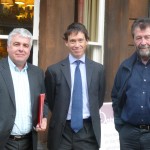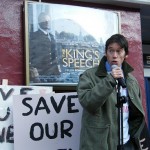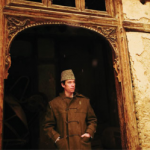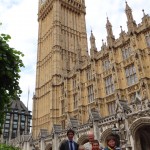two campaigns: penrith cinema and newton rigg
On Thursday, I defended Cumbrian community action in the London School of Economics, where the rhetoric was as extreme as the setting was bland. My opponents compared parish council initiatives to Athenian slavery and the Bombing of Baghdad, in front of a quiet scholarly audience in a lecture theatre. On Saturday, I was amidst the joyful and unsettling reality of the cinema demonstration, teetering on a stage above a crowd of perhaps six hundred. Some protesters stood beside the police, holding banners, as solemn as at a picket-line. The group by the toy-shop were funereally quiet; but from the Co-op came a sprinting whooping posse, in neon bodysuits, leaping on the stage like circus tumblers. Children were singing and old men had that astonished, happy expression which I associate with a successful wedding. When I invited people to buy a share in the cinema, fifty voices shouted ‘yes’ in unison and we raised £9,000 in nine minutes. Dawn, who was leading the march, dressed for the second week as Darth Vader chanting “Save our cinema!”, seemed to harness the shared faith of the crowd, and its incongruous insurrectionary energy.
The next day, I was worried that we had all been simply carried away into something very risky. I had helped convince Graves, the owner, to let us bid, but was the price right? How was this whole thing going to be managed? I cleared my Sunday afternoon and arrived in the Methodist Central Hall, expecting a meeting of half a dozen. But there were forty: some in jeans and weekend stubble – some in climbing gear, fresh from the hills – others dressed for the “Sunday Evening Extra”. It was a group of varied equals, from teenagers to pensioners: each with firm and different philosophies and political views. But Ruth, who I had never met before, somehow emerged as first among these equals. She ran the meeting with the crispness of a conference in “The West Wing”: assigning every task from structural surveying, to marketing, to share issues and charitable structures. She used jargon phrases, to which I have always been allergic (she talked about ‘task and finish groups’), but she used them accurately and to deadly practical effect. I could and did take on a small amount: setting up the website, finding an office space, contacting the seller. But the group took on the whole driving responsibility for the project. A teenager took over the website, an accountant immediately volunteered for the book-keeping, a council officer brought clarity and systems without ever imposing his views on the room. We’ve a very long way to go. But it’s difficult not to be optimistic when you see the people in that room. 6,000 people have already signed up to support the cinema.
But we now need a crisp, clear, single approach to saving Newton Rigg. We’ve known it has been at risk for eighteen months. But we are still not there. This is not because of Newton Rigg itself. It has a historic name, unique land and a county that supports it. It could flourish by investing in new agricultural technologies, in dairy, and in upland farming. And we need Newton Rigg for our economy, for our students, and for our farms. There has been no lack of community support: members of the Applefell group immediately launched a campaign, produced a compelling plan for the future of the campus and relentlessly kept the subject alive. The Herald has championed it. Eden District Council crafted a detailed Cumbrian bid to take over the services. The staff brought their own proposal. And there have been leaflets, demonstrations, and dozens of official meetings. But Newton Rigg is still not safe.
The Yorkshire college, Askham Bryan, might now be given Newton Rigg’s 1,000 acres – which is worth tens of millions if it were developed – by the Skills Funding Agency with no strings attached, in order to run the college. If the land were protected, I would welcome Askham Bryan: they have good skills, experience, a good plan and money. But we cannot give them even the option of selling up the land and the college in a few years and returning to Yorkshire. It would not just be the end of the land. It would be the end of over a hundred years of history, the end of hundreds of jobs, and the end of agricultural education in the uplands and the North-West.
We need one last push in this long difficult campaign and one focus: to ensure Newton Rigg is a flourishing agricultural college in a generation’s time. We must insist that, whoever takes the college, the land is protected by trust or strict covenant. There will be no movie heroes in this fight: the final terms will be set by accountants, and civil servants, and above all lawyers. But we need some cinema energy for Newton Rigg as well. Let’s gather more than the 6,000 names we got for the cinema – email [email protected] or write to me at the House of Commons – and let Carlisle and London see that we will not surrender this vital part of our heritage and our future.








